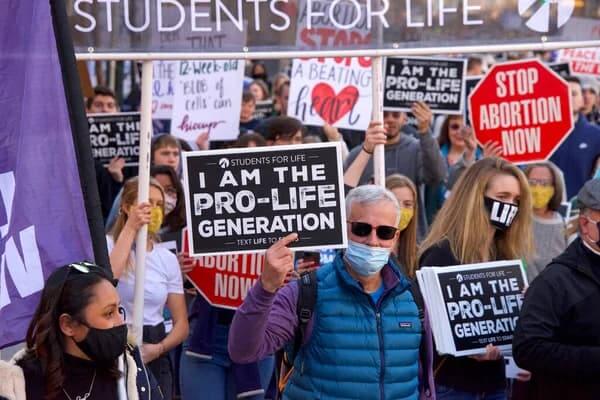In the United States, the topic of abortion is heavily tied to religious beliefs and political affiliations. However, it’s worth noting that one’s stance on abortion isn’t limited to these factors. In fact, there are atheists who hold pro-life beliefs, which may surprise some people. How common is this view among atheists? And what motivates someone without religious reasons to oppose abortion?
Are There Pro-Life Atheists?
Due to a scarcity of available data on the matter, it’s clear that pro-life atheists do exist. In a 2014 Gallup poll of Americans’ views on abortion, 15% of those who identified as having no religion said that abortion should be illegal in all circumstances.
Although this constitutes a minor portion in comparison to the overall population, it’s still a sizable number of people who don’t necessarily base their opinions on religious teachings.
- One possible reason for the existence of pro-life atheists is the belief in the sanctity of human life. This belief holds that all human life is valuable and should be protected, regardless of religion or other factors. Some atheists may come to this conclusion through their own philosophical or ethical reasoning without relying on religious teachings;
- Another factor that could contribute to pro-life views among atheists is a concern for individual rights and freedoms. Some may argue that the most fundamental of all is the right to life and that denying that right to unborn children is a violation of their human rights.
It’s also worth noting that being an atheist doesn’t mean someone automatically supports abortion. Atheism can be defined as the absence of belief in a deity or gods; it doesn’t dictate a person’s moral code or political views. It’s entirely possible to arrive at a pro-life stance through secular reasoning.
Additionally, some pro-life atheists may have personal experiences or circumstances that influence their views on abortion. For instance, an individual who was adopted during childhood may feel a strong connection to the idea of protecting unborn children and giving them a chance at life.
Despite the existence of pro-life atheists, the issue of abortion remains a contentious and divisive topic. It’s important for individuals on both sides of the debate to listen to and respect each other’s perspectives, even if they don’t agree.
Atheists Who Reject Abortion: A Growing Movement
Despite the stereotype that pro-life views are exclusively held by religious conservatives, there are atheists who are actively advocating for the protection of unborn human life. The group Secular Pro-Life, for example, was founded in 2009 and seeks to “forge a unique and growing alliance, without compromising our respect for human rights.” They argue that recognizing the humanity and worth of the unborn isn’t inherently religious but a matter of basic human rights.
It is worth noting that while numerous religious organizations have expressed strong opposition to abortion, there are also secular groups that hold similar views. This highlights the fact that the issue of abortion is not necessarily a religious one but rather a moral and ethical one that can be approached from a variety of perspectives.
One argument put forth by some atheists who oppose abortion is that the unborn child is a human being with inherent value and dignity, regardless of its stage of development. They argue that just as it is wrong to take the life of a born human being, it is also wrong to take the life of an unborn human being.
Furthermore, some atheists who oppose abortion believe that it is inconsistent to support other social justice causes, such as fighting poverty and promoting environmental sustainability, while also supporting abortion rights. They argue that a consistent life ethic, which opposes violence in all forms, demands protection for the vulnerable unborn.

It is worth highlighting that not all atheists are opposed to abortion, and there is a wide range of opinions on the issue within the atheist community. However, the fact that there are atheists who reject abortion challenges the notion that pro-life views are solely based on religious beliefs.
Ultimately, the issue of abortion is a complex and multifaceted one, and it is important to engage in respectful and thoughtful dialogue in order to better understand the various perspectives and arguments involved.
Distribution of Abortion Opinion By Political Ideologies
Abortion is a topic that has been heavily debated in the United States for decades. While it’s true that the pro-life movement has become heavily associated with conservative politics, it’s important to note that there are atheists who identify with right-wing beliefs and reject abortion. However, overall data shows that political ideology plays a significant role in shaping opinions on abortion.
A 2021 Pew Research Center study determined that 83% of people who identify as conservative or very conservative believe that abortion should be illegal in all or most cases. This is compared to just 31% of those who identify as liberal or very liberal. This divide likely includes a significant portion of people who are religious, but it’s clear that political alignment independently influences attitudes toward abortion.
Additionally, the study revealed the majority of Republicans (76%) believe that abortion should be illegal in all or most cases, while the majority of Democrats (66%) believe that it should be legal in all or most cases. There is a clear contrast in opinion between the two parties, and it’s clear that political affiliation is a strong predictor of one’s stance on abortion.
Interestingly, the study found that the opinions of those who identify as moderate or lean slightly left or right are more evenly split. Although the belief of a significant number of individuals who identify as moderately conservative (62%) centers around the notion that abortion should be prohibited in the majority, if not all, cases, only 25% of those who identify as slightly liberal hold the same belief.
It’s worth noting that opinions on abortion are not solely influenced by political ideology. Factors such as religion, education level, and personal experiences can all play a role in shaping one’s stance on the issue. However, the data shows that political affiliation is a significant factor in determining one’s opinion on the legality of abortion.
As the debate over abortion continues, It is essential to take into account the diverse factors that contribute to the variation in opinions on the issue. While political ideology is a strong predictor of one’s stance, it’s important to recognize that there is a diversity of opinions on the topic, even within political parties.
Importance of The Matter of Abortions for Different Religions
Abortion is a highly debated topic that has been at the forefront of political and social discussions for decades. While there are atheists who oppose abortion, it’s true that religion often plays a key role in shaping beliefs on this issue.
- Catholicism, for example, is traditionally opposed to abortion because it views all human life as sacred and worthy of protection. According to Catholic doctrine, life is considered to commence at the moment of conception, and abortion is a grave sin. This conviction stems from the concept or notion that each individual is formed in the image and likeness of God and that every life is valuable and should be protected;
- Similarly, many Protestant denominations also oppose abortion based on the argument that it infringes upon the sanctity of human life. Evangelical Christians, for example, believe that life begins at conception and that abortion is a form of murder;
- Other religions, such as Judaism and Islam, may also oppose abortion or view it as a complicated ethical issue. In Judaism, the value of human life is paramount, and the Talmud states that “he who saves a single life, it is as if he saved an entire world”;
- Many Jewish scholars believe that abortion is only permissible in cases where the mother’s life is in danger. Similarly, in Islam, the sanctity of human life is highly valued, and many According to Islamic scholars, abortion is deemed permissible solely in circumstances where there is a threat to the mother’s life or in instances of pregnancies resulting from rape or incest.
It’s worth noting, however, that not all members of a particular faith will necessarily hold the same views on the topic. There are many Catholics, for example, who uphold a woman’s autonomy and endorse the notion that the choice to have an abortion should rest with the individual.
Overall, the religious diversity of pro-life activism showcases the idea that the protection of unborn human life is not limited to any one belief system. Many people, regardless of their religious identification or lack thereof, believe that the right to life should extend to all humans, including those yet to be born. The debate over abortion will continue to be a contentious issue, but it’s important to remember that it’s possible to have differing opinions while still respecting the beliefs of others.
Summing Up
Pro-life atheists may not be the loudest voices in the abortion debate, but they do exist and are a growing movement. Rejecting abortion doesn’t have to be rooted in religion, and many atheists come to their pro-life views through secular reasoning and human rights principles. While political alignment and religion may play a role in shaping attitudes toward abortion, it’s clear that the issue is multifaceted and can’t simply be boiled down to partisan politics or religious doctrine.


No Responses